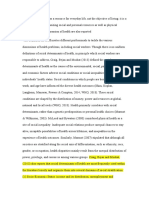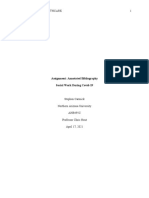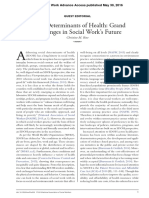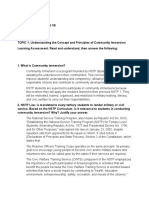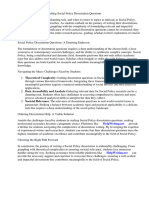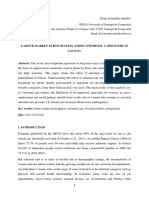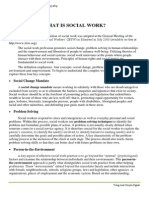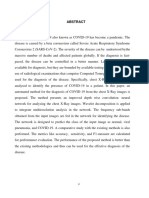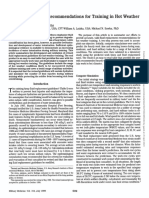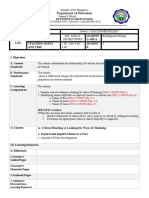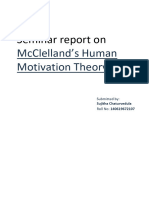Critical Social Work as Human Rights practice in Hospital Discharge settings
Introduction
This essay will discuss Critical Social Work as Human Rights practice in Hospital Discharge settings. It is undeniable that in hospital settings, besides human rights, social work is a profession that works with risk and poverty. I chose this topic because the process of discharging people from hospitals during the Covid-19 pandemic had raised human rights issues, including their right to liberty, well-being, and independence. Prior to the pandemic, all the necessary assessments to facilitate a safe discharge were taking place in the hospital setting. According to the new Discharge to Assess model (D2A), these evaluations should no longer occur in the hospital but rather at the person's home or in a care facility. Instead, in order to accommodate additional patients, the focus is on freeing up hospital beds. This is a source of worry, given theaim of the evaluations that were conducted in the hospital was in part to verify that the discharge plans were safe once they were completed. When addressing hospital discharges during the present pandemic, my aim is to examine how critical social work can be applied.
Critical Social Work
is social workers' ability to perceive a person'ssituation as a result of other broader social processes and events that mayhave affected them directly or indirectly. Those who practise Critical SocialWork strives to achieve a complex interweaving of goals applicable at both anindividual and a social level. A further feature of Critical Social Workpractice is an enhanced awareness of power disparities between social workersand their clients, which is the second characteristic. (Weiss-Gal et al.,2014). A third trait is the ability to collaborate and converse with others.Individuals receiving services, members of their families and communities andother professionals are all regarded as essential partners who possessknowledge that is relevant to the interpretation of complex and uncertainsituations, difficulties, and needs, as well as the decision-making andintervention processes in which they are involved (Spencer et al., 2000). Theknowledge and attention paid by social workers to the importance of language isthe fourth aspect of Critical Social Work Practice (Rossiter, 1996). To docritical social work effectively, social workers must refrain from employinglanguage that generates resistance between them and their clients or fostersuneven power relations between them and their social workers. (Weiss-Gal et al.,2014). Conventional social work is a method that prioritises doing assessments and meeting the needs of clients by setting up necessary services and supports. Conventional social work focuses on professional competencies, standards, accreditation, professional growth, and ethics (
Duffy, 2017 citing
Mendes, 2009) On the other hand, the purpose of critical social work is to empower individuals with less power by challenging systems rather than the individual (Duffy,2017 citing Chenoweth and McAuliffe, 2015; Payne, 2014) Various literature has pointed out that social workers are essential contributors to thecollective construction of human rights and recognise that human rights are contentious and complex in social work. The key issues identified in Hospital settingsdemonstrate that in some situations, it appears impossible to reconcile the approach
of beginning with the needs experienced by communities with the bureaucratic processes of institutions inside a system, despite relying on human rights. (Reynaert et al., 2022). I will discuss key issues in the following chapters from a critical social work perspective. Human rights have been a part of social work for more than a century, first in writings, then in accounts of and about human rights activists, and finally in many of the standard documents of the International Association of Schools of Social Work (IASSW), the International Federation of Social Workers (IFSW), and the International Council of Social Welfare, which have become "institutionalised" (ICSW). The International Commission on Human Rights was founded in 1988. (Staub-Bernasconi, 2016). The Human Rights Act 1998 became effective in the UK on October 2, 2000. This Act had ramifications for the National Health Service, but they are hypothetical and have not yet been extensively tested in court.
Ageism
The UK's National Health Service, established at the end of the Second World War, represent a citizenship right to the best health care. Since the NHS was founded, theneeds of the population and the field of medicine have advanced to the point that they have undergone a complete transformation, such as fewer children and living longer lives, even though expectations regarding the universality of NHS provision have not changed. (Burrows, 2020). Future of an Ageing Population, a recent report from the Government Office for Science, serves as a helpful reminder of the extent of the changes we must adapt to. It outlines the aspects of our society that the ageing population is affecting, including the workplace, how and when we learn, the neighbourhoods where we live, the family and household structure, the availability of health and social care services, and how we use technology. (The future of an ageing population needs a response today, 2022) Due to the current environment, case management practises in social work have changed, resulting in practitioners' de-professionalisation (Gorman, 2003). Social workers have taken over the administrator position, and the evaluations carried out are based on recommendations to other professional organisations. Their administrative responsibilities hampered the social workers' ability to deal with clientsmore personal. We can observe a similar process in developing the role of nurses and doctors. Nursing has changed from a 'vocation' to an occupation throughout the years. (Jolley, M.,1989). This has added more administrative responsibilities; therefore, nurses have less time and resources to spend with the patients. This can be problematic when majority of inpatients are considered old age. Studies have shown that social interaction are more important for elderly people as part of their care. "The effect of both the ongoing development of medicine and the professionalisation of nursing is that wards and clinics have become spaces in whichthe emphasis is upon
cure
rather than
care"
(Burrows, 2020 page number ). The
author follows up by explaining that at present times institutions like hospitals are potential grounds for ageist practises, and this is not always due to deliberate neglect to patients' feelings, rights, or well-being as they age; rather, it's because hospital's organisational cultures evolved from a model in which specialists in narrowdisciplines were cultivated.
“Older persons face challenges that are not addressed in existing international human rights standards’’
(Ageism in human rights law, 2022).
According to a survey by the London School of Economics, one million older people in hospitals experienced 'low or unequal standards of dignity and respect,' and 640,000 reported not receiving sufficient assistance with eating. (Human rights of older persons and their comprehensive care July 2017, 2022) From a critical social work perspective, there is no single department accountable for addressing all of the concerns.
The ramifications span numerous departments such as economy, infrastructure, human resources etc., with the implementation of policies by one frequently having a direct or indirect impact on another. These connections imply that the goals of one department may be achieved through the policies of another (The future of an ageingpopulation needs a response today, 2022). Traditionally, conventional social work would act oblivious to this; a critical perspective is necessary, especially in hospital settings where delayed discharges have created a “blame culture’’ on social services. A significant number of delays are caused by external organisations or caused by NHS alone; critical social work would challenge the preconceptions that social services are entirely responsible for delayed or premature discharges. (Burrows, 2020);
Practitioners would identify and work with the underlying social factors responsible for the current social order. Although effective discharge planning requires time, speed is prioritized over all other factors in the hospital's system. A holistic approach in which complexity and uncertainties are adequately addressed is crucial for effectively discharging older adults whose health is frail. Prioritizing efficiency and minimizing risk makes patient compassion a secondary consideration and promotes patients' social and psychological requirements to be neglected. In the hospital environment, older adultsare seen as ‘’difficult to treat’’, blocking beds and not responding to interventions similarly to a younger person. The ageing population is expected to be an indicator of good health; unfortunately, in a market-focused ideology, being older is not valuable for the economy; this has implications on family dynamics when it is expected for younger people to work and take care of their elderly. Critical social work will challenger for older people outside of the hospital setting such as housing, loneliness, and abuse. Burrows suggests that critical gerontology
Neoliberalism
Neoliberalism has changed the way social work is performed since the 1970s(REF?). Harris (2014) says that ‘’neoliberalism's effects on social work can be summed up in three main ways: marketization, consumerization, and managerialism.’’ (Older People: Covid19 meets neoliberalism (NM), 2022)
Permanent jobs and relationships, shared responsibilities have been replaced by globalisation and intolerance of imperfections. Older people in a neoliberal ideology face challenges when the ‘’risk is transferred from the State to the individual’’
(Ageingin an era of neoliberalism: the impact of extending working lives | British Politics and Policy at LSE, 2022)When addressing the mental health of older people, neoliberal ideology promotes the medicalization of distress, by focusing on personal responsibility and diverting attention from the complex interactions between ''human bodies, medicine, and the social, economic, and political aspects of health and illness'’.
An emphasis on human
rights will address the underlying societal issues that are contributing to illnesses. (Herrawi, F. et al., 2022)





